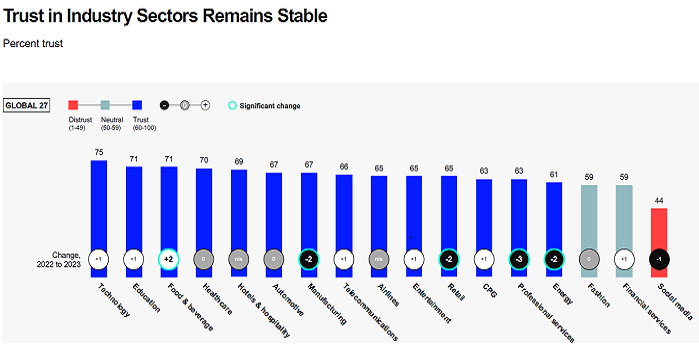The Edelman Trust Barometer is a comprehensive study conducted every year since 2000 by Edelman, a global communications firm, to measure the current level of trust around the world in institutions such as Governments, Businesses, NGOs, and the Media. It usually generates significant attention and debate about Edelman and clients potentially deriving business value from exploiting the notion of Trust in managing reputation.
This article focuses solely on the results of the 23rd survey which was released around the World Economic Forum last month and the interesting insights it reveals, which seem to encourage business leaders to be the actors of change for trusted practices and technologies in a world where governments and their representatives have lost voters’ trust.
This year’s survey is based on interviews with 32’000 respondents in 28 countries. This time again, it shows how Trust is a complex and multifaceted concept, as opinions and perceptions vary among individuals, communities and countries. Trust can also be influenced by a range of factors such as personal experiences, media coverage or cultural and social contexts.
The backdrop for the report is 2022, the post pandemic year, the year of a return to normal life and economic rebound. To the contrary, we faced a Russian invasion of Ukraine, an Afghan crisis and an Iranian freedom movement. But not only. We also saw an increase in people struggling to feed themselves compared with before the pandemic, a worldwide inflation crisis as well as persistent droughts.
In Switzerland, a recent announcement by the CFF to increase the level of camera surveillance in train stations throughout the country, has triggered concerns and actions from politicians and citizens alike, fearing and distrusting a systematic spying in the public space whether for commercial or security reasons.
The collapse of trust in current economical contexts but businesses seen as most competent
What are the consequences of all that on the world level of trust? Let’s break it down.
First, according to the 2023 Barometer, economic optimism is collapsing around the world: in 24 out of 28 countries, the number of people who think their family will be better off in five years has never been lower.
Second, on a more individual aspect, personal anxieties and existential societal fears have become impressively high. Out of all the people interviewed, 89% fear to lose their job, 76% are scared of climate change and 74% fear inflation and its negative impact on their purchasing power. Sadly, fears of a potential nuclear war, of food or energy shortage, are not much lower.
The Barometer also reveals an evaporation of trust across most institutions. People persistently do not trust the media or social media which create even more entranched divisions. Trust in media declines in 16 of 27 countries. Trust in Governments and institutions declines in 14 of 27 countries.
The level of trust in the United Nations (UN) has also decreased in 21 of 27 countries and the current level is 59%, a 2% decrease compared to the previous year.
The survey reveals that trust in the UN varies widely depending on the region. The UN suffers from the lowest level on trust in the U.S. and Europe. But it reaches its worst level in Japan with 35 %! However, China, Indonesia, Thailand and India win the award of the countries trusting the most the institution (with a level between 78% and 80% ).
On the other hand, despite the criticisms it faced because of its initial response to the COVID-19 pandemic, the UN agency responsible for international public health, the World Health Organisation (WHO), becomes the most trusted global organisation in the world (67%). Its level of trust varies according to regions, its handling of specific health crises, political controversies, and media coverage, but it stays surprisingly high.

Taking a closer look to the results, Businesses seem to be the only institution seen as competent and ethical (with the greatest trust increase in the U.S.) and Family-Owned Businesses are the most trusted of all. Trust in industry sectors such as Technology, Education, Food & Beverage as well as Healthcare remains the highest.
NGOs and Businesses are seen as the most reliable source of trustworthy information, unlike Governments and the Media.
The report shows that in the globalised economy, trust is still very much local. We tend to trust people in our neighborhood, our local community, and our coworkers more than Government leaders, journalists or CEOs.
In summary, the Edelman’s 2023 trust barometer paints a complex and multifaceted picture of the current state of trust around the globe.
The continued erosion of trust in traditional institutions represents a significant challenge for leaders, policymakers and business owners. To rebuild trust and to rebalance a polarized world, it is obvious that actions, not words, and measurable results bringing a positive difference to the close nexus of human and animal populations as well as the environment, are now more than ever needed.
